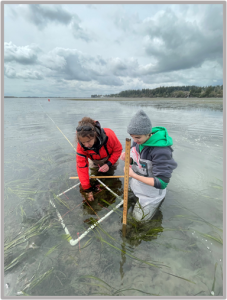June 11 – July 2, 2025
Ecology of Infectious Diseases in a Changing Ocean
Taught by Maya Groner
The past decade has seen an explosion in research exploring how ecological processes drive the emergence and persistence of diseases in humans and wildlife, most notably with increasing climate warming and the global pandemic of covid-19. Case studies such as the shifting distributions of mosquito populations with global climate change, the associated emergence and spread of diseases such as malaria and Zika fever, and the emergence of Lyme disease as humans have spread and fragmented forested habitats, have garnered worldwide attention.
The emergence of the ecology of infectious diseases in marine ecosystems as a recognized area of research owes much to the development of epidemiological theory and rigorous development of disease ecology research in terrestrial systems. Comparative research shows that epidemiological processes differ widely in the ocean and on land, with greater parasite phylogenetic diversity in the oceans compared with land and the tendency toward different trophic strategies. Human activities also vary widely between marine and terrestrial ecosystems, and activities such as fishing and aquaculture have shown to profoundly influence the abundance and distribution of marine species and their interactions with naturally-occurring and introduced parasites. The unique attributes of diseases in marine ecosystems have underpinned the expansion of theory from the fields of epidemiology and marine ecology to support the development of a robust discipline focused on quantitative understanding of marine diseases.
The training workshop on marine infectious disease ecology will feature experts in the field and include a lecture focus by resident and guest speakers on general aspects of marine infectious disease ecology, including climate drivers. The field and lab skills will use eelgrass disease as a model system to teach for the following skills (depending on interests of students):
- Designing and conducting surveys on host-pathogen interactions in the San Juan Islands
- Learning how to test Koch’s postulates (to prove that a pathogen causes disease)
- Characterization of gross and histological pathology
- Learning and testing major theories of disease ecology
- Learning genetic and genomic techniques for understanding disease processes
- Working with mathematical models for marine diseases that affect plants, such as eelgrass, and ecosystem engineers, such as oysters
- Combining the above methods to address ecological questions about the drivers of host-pathogen interactions and the mechanisms underlying them.
This training workshop will equip students with a broad understanding of host-pathogen interactions as well as the techniques used to study the ecology of marine diseases in situ. We provide students with a unique opportunity to use state-of-the-art tools and technologies, do fieldwork in a highly biodiverse environment, join a network of active disease ecologists and, potentially, collaborate on publishable research projects.
The training workshop will be broadly split into three modules, focused on:
- Field and lab approaches for quantifying the effects of marine diseases
- Introduction to marine disease modeling
- Molecular approaches for quantifying epidemiological processes at multiple
levels of organization.
Major concepts within these disciplines will be taught in the lecture part of the workshop, while laboratory and field activities will utilize the eelgrass wasting disease system to demonstrate specific skillsets.
STUDENT SELECTION CRITERIA
This course is appropriate for graduate students, postdoctoral investigators, and advanced undergraduates.
Application materials must include:
- Personal statement indicating your (1) interest in the chosen training workshop, (2) how the workshop will influence your career path, and (3) what aspects of the workshop you are most interested in
- CV
- Name and contact information for one reference
- Transcript if applicant is an undergraduate or not yet in graduate school
